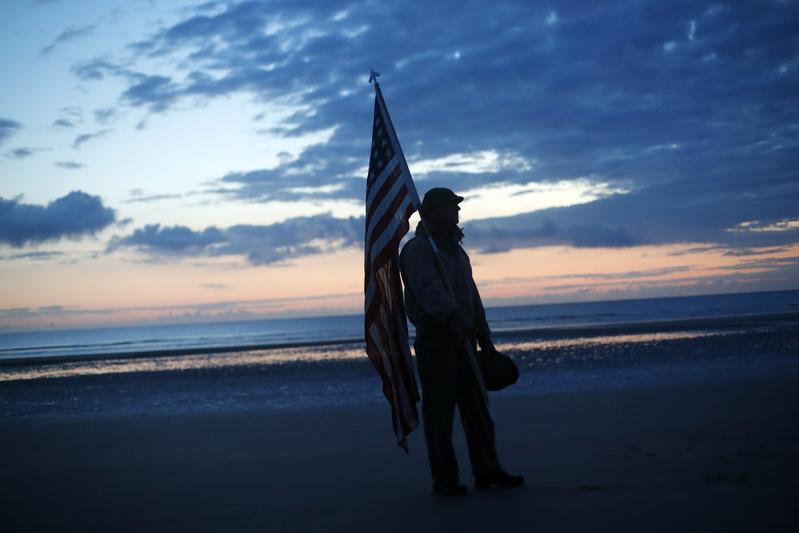 Udo Hartung from Frankfurt, Germany, a World War II reenactor holds the US flag as he stands at dawn on Omaha Beach, in Normandy, France, June 6, 2019 during commemorations of the 75th anniversary of D-Day. (THIBAULT CAMUS / AP)
Udo Hartung from Frankfurt, Germany, a World War II reenactor holds the US flag as he stands at dawn on Omaha Beach, in Normandy, France, June 6, 2019 during commemorations of the 75th anniversary of D-Day. (THIBAULT CAMUS / AP)
OMAHA BEACH, France — The five beaches are silent at dawn but forever haunted.
D-Day cost the lives of 4,414 Allied troops, 2,501 of them Americans. More than 5,000 were injured. On the German side, several thousand were killed or wounded
As the sun rose Thursday over the Normandy coastline where thousands of men bled and died 75 years ago, a fast-diminishing number of World War II veterans remembered D-Day and hoped the world never forgets the sacrifices made to dismantle Nazi tyranny.
The sea of mercury blue couldn't have been more peaceful as day broke over Omaha Beach, the first of five code-named beaches where the waters ran red the morning of June 6, 1944, when Allied forces came ashore to push the Nazis out of France.
Hundreds of people, civilians and military alike, hailing from around the world, gathered at the water's edge, awash in emotion.
On the western edge of Omaha, dense crowds formed a human chain and tossed red and white chrysanthemums into the gently lapping waves, remembering. At a statue of an infantryman clutching a rifle and hauling a fallen comrade that overlooks the sand, veterans' descendants spoke about their family members who fought on the beach and laid red roses at the feet of the statue.
ALSO READ: Normandy tries to keep alive 'infinite gratitude' for D-Day
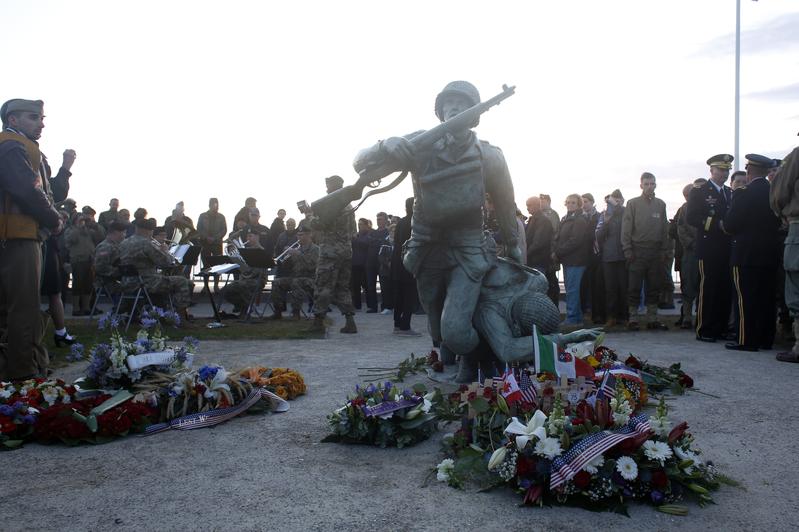 Floral tributes are placed at the National Guard Monument Memorial as members of the USAREUR band plays in the background near Omaha Beach, in Normandy, France, June 6, 2019 during commemorations of the 75th anniversary of D-Day. (THIBAULT CAMUS / AP)
Floral tributes are placed at the National Guard Monument Memorial as members of the USAREUR band plays in the background near Omaha Beach, in Normandy, France, June 6, 2019 during commemorations of the 75th anniversary of D-Day. (THIBAULT CAMUS / AP)
A lone piper played in Mulberry Harbor, exactly 75 years after British troops came ashore at Gold Beach.
"It is sobering, surreal to be able to stand here on this beach and admire the beautiful sunrise where they came ashore, being shot at, facing unspeakable atrocities," said 44-year-old former US paratrooper Richard Clapp, of Julian, North Carolina.
After Britain's spirited anniversary tribute Wednesday to the derring-do of the Allied forces that set off from England to defend democracy, France is hosting a series of solemn ceremonies Thursday in the country where so many young lives ended in sand and sea.
Leaders from the United States, Britain, Canada, France — and then-foe and now-ally Germany — will once again laud the troops who stormed the fortified Normandy beaches to help turn the tide of the war and give birth to a new Europe, since at peace.
Dick Jansen, 60, from the Netherlands, drank Canadian whisky from an enamel cup on the water's edge, where people held moments of silence and some saluted.
"Every time we come here, we drink at the moment they came onto the beach, a whisky for the guys who came no further," he said.
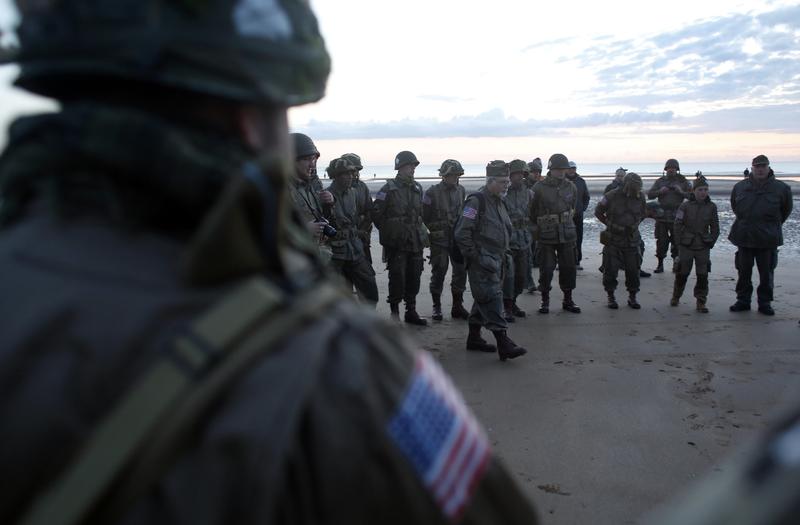 World War II reenactors from Switzerland gather at dawn on Omaha Beach, in Normandy, France, June 6, 2019 during commemorations of the 75th anniversary of D-Day. (THIBAULT CAMUS / AP)
World War II reenactors from Switzerland gather at dawn on Omaha Beach, in Normandy, France, June 6, 2019 during commemorations of the 75th anniversary of D-Day. (THIBAULT CAMUS / AP)
Norwegian Sigrid Flaata drove from Oslo in a 1942 restored jeep to honor the soldiers who died on D-Day. Belgian Filip Van Hecke called his journey a "small effort to pay homage."
Remembrances are taking place throughout the day at the military cemeteries where countries buried their fallen citizens.
Passing on memories is especially urgent, with hundreds of World War II veterans now dying every day.
A group of five Americans parachuted into Normandy on Wednesday as part of a commemorative jump, and showed up on the beach Thursday morning still wearing their jumpsuits, all World War II-era uniforms, and held an American flag. All five said they fear that the feats and sacrifices of D-Day are being forgotten.
French President Emmanuel Macron and US President Donald Trump will look out over Omaha Beach, the scene of the bloodiest fighting, from the cemetery with grave markers for over 9,000 Americans, servicemen who established a blood bond between the US and its trans-Atlantic allies.
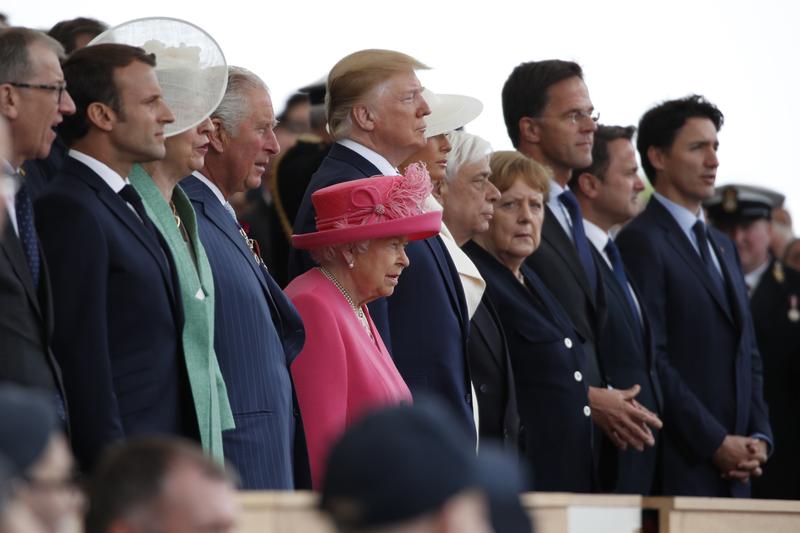 Queen Elizabeth II and World leaders stand during an event to mark the 75th anniversary of D-Day, June 5, 2019, in Portsmouth, England. (ALEX BRANDON / AP)
Queen Elizabeth II and World leaders stand during an event to mark the 75th anniversary of D-Day, June 5, 2019, in Portsmouth, England. (ALEX BRANDON / AP)
"I have all kinds of friends buried," said William Tymchuk, 98, who served with the 4th Canadian Armored Division during some of the deadliest fighting of the brutal campaign after the Normandy landings.
"They were young. They got killed. They couldn't come home," Tymchuk, who was back in Normandy, continued.
"Sorry," he said, tearing up. "They couldn't even know what life is all about."
The biggest-ever air and seaborne invasion took place on D-Day, involving more than 150,000 troops that day itself and many more in the ensuing Battle of Normandy. Troops started landing overnight from the air, then were joined by a massive force by sea on the beaches code-named Omaha, Utah, Juno, Sword and Gold, carried by 7,000 boats.
In that defining moment of military strategy confounded by unpredictable weather and human chaos, soldiers from the US, Britain, Canada and other Allied nations applied relentless bravery to carve out a beachhead on ground that Nazi Germany had occupied for four years.
"The tide has turned! The free men of the world are marching together to Victory," Gen Dwight D Eisenhower predicted in his order of the day.
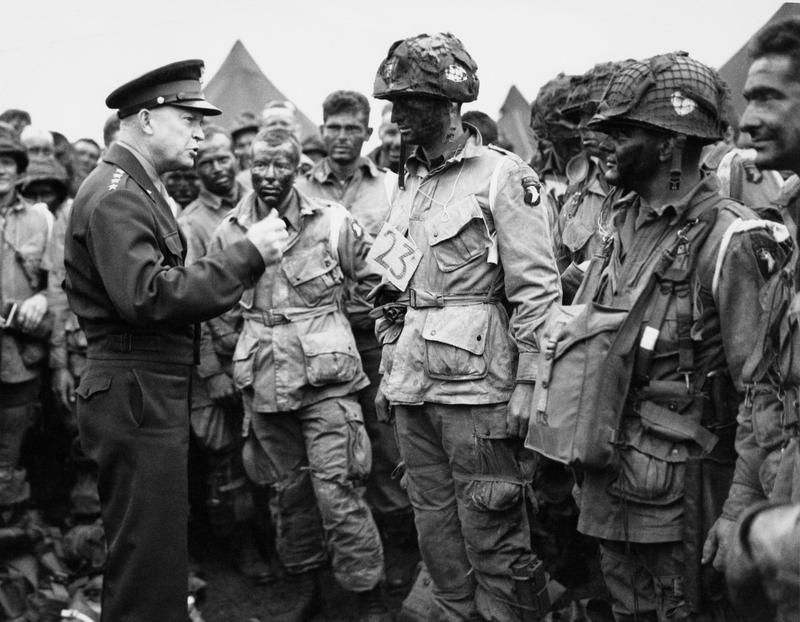 In this June 6, 1944 file photo, US Gen Dwight D Eisenhower, left, gives the order of the day to paratroopers in England prior to boarding their planes to participate in the first assault of the Normandy invasion. (US ARMY SIGNAL CORPS / AP)
In this June 6, 1944 file photo, US Gen Dwight D Eisenhower, left, gives the order of the day to paratroopers in England prior to boarding their planes to participate in the first assault of the Normandy invasion. (US ARMY SIGNAL CORPS / AP)
The Battle of Normandy, codenamed Operation Overlord, hastened Germany's defeat less than a year later.
Still, that single day cost the lives of 4,414 Allied troops, 2,501 of them Americans. More than 5,000 were injured. On the German side, several thousand were killed or wounded.
From there, Allied troops would advance their fight, take Paris in late summer and march in a race against the Soviet Red Army to control as much German territory as possible by the time Adolf Hitler died in his Berlin bunker and Germany surrendered in May 1945.
The Soviet Union also fought valiantly against the Nazis — and lost more people than any other nation in World War II — but those final battles would divide Europe for decades between the West and the Soviet-controlled East, the face-off line of the Cold War.
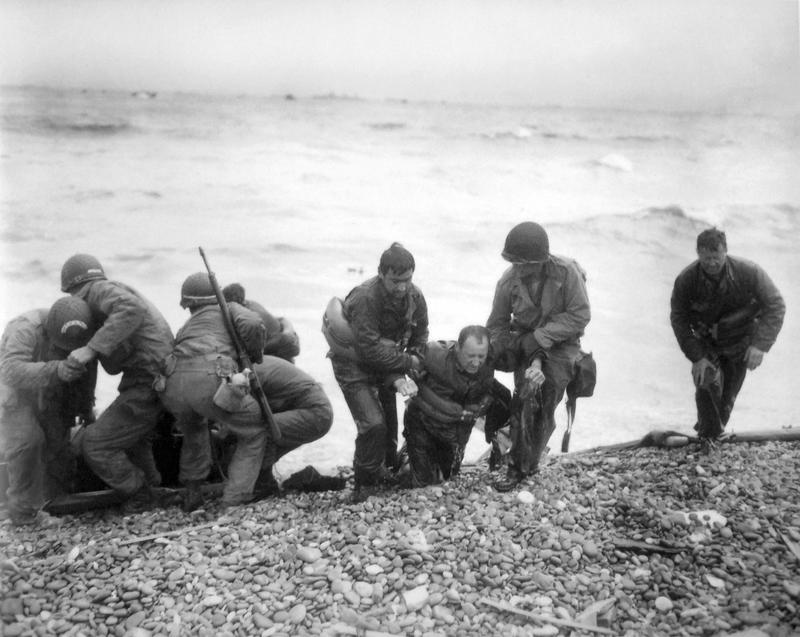 In this June 6, 1944 photo, members of an American landing unit help their comrades ashore during the Normandy invasion. (LOUIS WEINTRAUB / POOL PHOTO / AP)
In this June 6, 1944 photo, members of an American landing unit help their comrades ashore during the Normandy invasion. (LOUIS WEINTRAUB / POOL PHOTO / AP)
Queen Elizabeth, who was an army mechanic during World War II while her father George was king, said that when she attended a 60th anniversary commemoration 15 years ago, many thought it might be the last such event.
READ MORE: Twin brothers reunited 74 years after WWII death at Normandy
"But the wartime generation — my generation — is resilient," she said, striking an unusually personal note.
"The heroism, courage and sacrifice of those who lost their lives will never be forgotten," Elizabeth said. "It is with humility and pleasure, on behalf of the entire country — indeed the whole free world — that I say to you all, thank you."
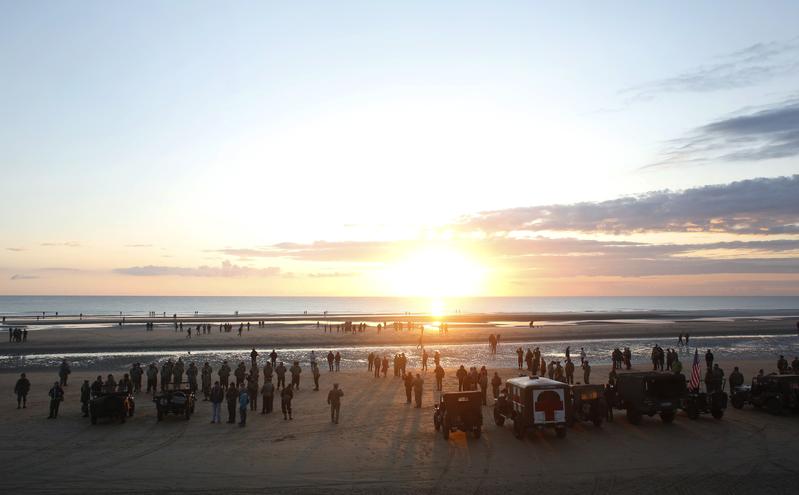 World War II reenactors stand on Omaha Beach, in Normandy, France, at dawn of June 6, 2019 during commemorations of the 75th anniversary of D-Day. (THIBAULT CAMUS / AP)
World War II reenactors stand on Omaha Beach, in Normandy, France, at dawn of June 6, 2019 during commemorations of the 75th anniversary of D-Day. (THIBAULT CAMUS / AP)


